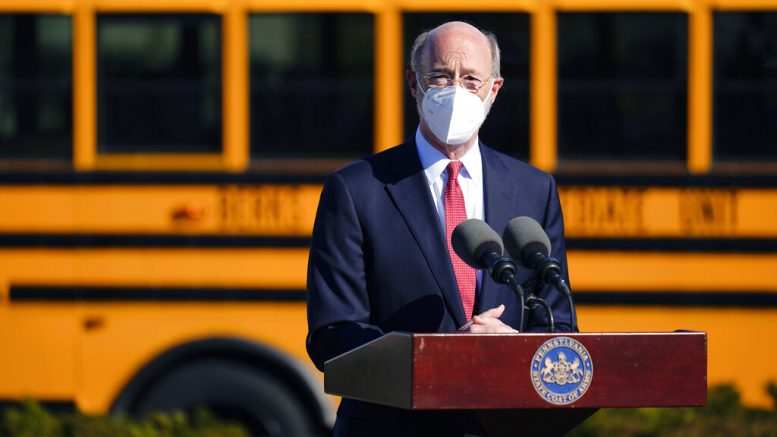HARRISBURG (AP) — Gov. Tom Wolf will expand more business and event capacity limits and lift a raft of long-standing coronavirus restrictions on bar service starting on Easter Sunday, giving some relief to one of the hardest-hit business sectors, his administration said Monday.
The announcement relaxing capacity limits on events is the second time Wolf has taken such a step this month as spring sports seasons start up, virus-related hospitalizations continue to decline and the number of people getting vaccinated rises each day.
“It’s time to allow our restaurants, bars and other service businesses to get back to more normal operations,” Wolf said in a statement.
The relief is still three weeks away, meaning bars and restaurants will still have to live with the current limits during St. Patrick’s Day celebrations and the NCAA Tournament’s March Madness craze.
Wolf made the move as restaurant, bar and hotel trade associations were pushing for relaxed limits and pointing to other states making similar moves. For restaurants, the relaxed restrictions means they can capitalize more fully on Easter business.
Those establishments can raise indoor capacity limits to a maximum of 75% from 50%, but must follow the state’s social-distancing requirements, which include wearing masks except for when eating and drinking and keeping tables 6 feet apart.
“Easter is a big holiday for the restaurant industry, so being at 75% goes a long way for the industry to promote Easter specials and Easter events,” said Melissa Bova, the organization’s vice president of government affairs.
Going away are a ban on seating at the bar and serving alcohol after 11 p.m., as well as a requirement that patrons order food with their alcoholic drinks.
The restriction on bar seating has been a heavy blow for some bar owners.
Jennifer Wilson, who owns Alliger’s House of Wings in Sayre, near Pennsylvania’s northern border with New York, doesn’t have much space for patrons to sit at tables.
So the establishment has lost business to bars just across the border in Waverly, New York, where capacity limits are higher and patrons can sit at the bar, she said.
Word that Pennsylvania will relax those restrictions didn’t make Wilson feel any warmer toward Wolf after a difficult year staying in business.
“It’s hard to be grateful, honestly,” Wilson said. “That’s the nicest way I can word it. It’s been a long time coming.”
Other businesses can also move to 75% of maximum capacity, including personal services salons, gyms, casinos, theaters and malls.
For gatherings, outdoor events can start to host up to 50% of maximum capacity, up from 20%, while indoor gatherings can host up to 20% of maximum capacity, up from 15%.
That was a smaller increase than hotels, events planners and caterers were hoping to see, Bova said. Some are already starting to see clients cancel their fall wedding dates because of concerns that capacity limits will still be in place, she said.






































